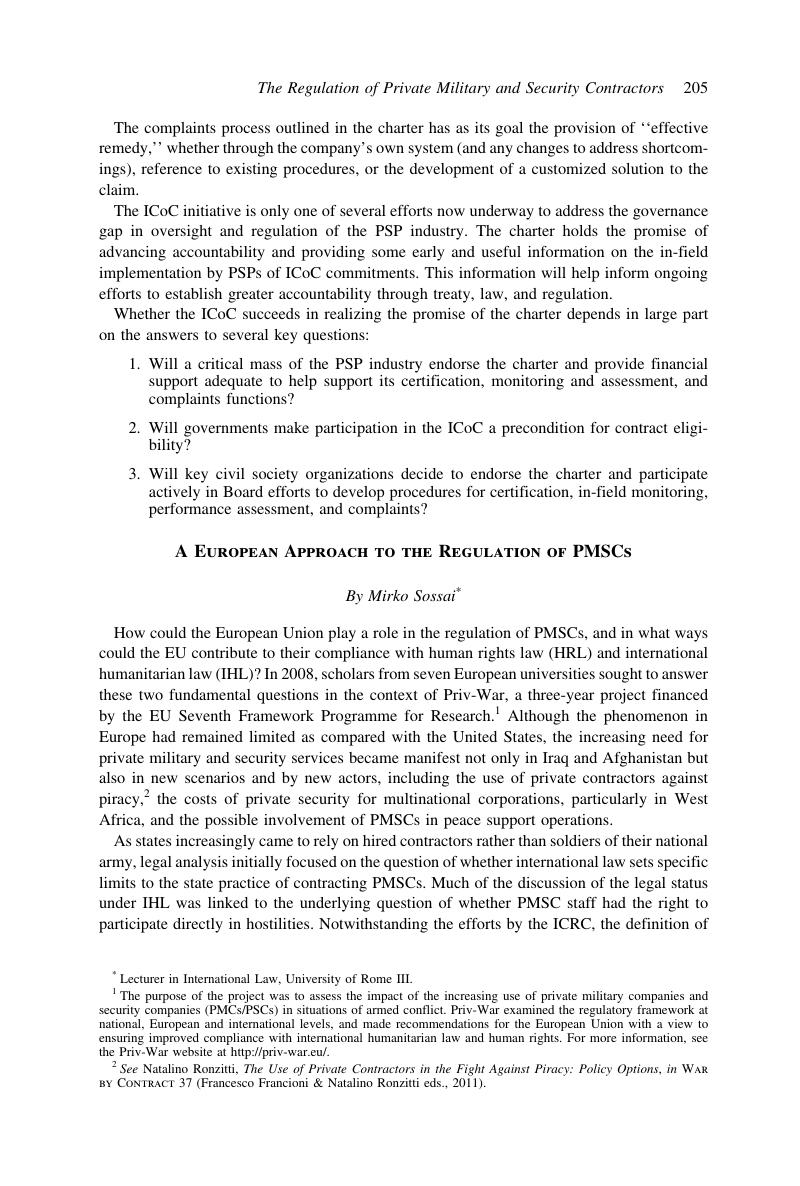Article contents
A European Approach to the Regulation of PMSCs
Published online by Cambridge University Press: 20 January 2017
Abstract

- Type
- The Regulation of Private Military and Security Contractors
- Information
- Copyright
- Copyright © American Society of International Law 2014
References
1 The purpose of the project was to assess the impact of the increasing use of private military companies and security companies (PMCs/PSCs) in situations of armed conflict. Priv-War examined the regulatory framework at national, European and international levels, and made recommendations for the European Union with a view to ensuring improved compliance with international humanitarian law and human rights. For more information, see the Priv-War website at http://priv-war.eu/.
2 See Ronzitti, Natalino, The Use of Private Contractors in the Fight Against Piracy: Policy Options, in War by Contract 37 (Francioni, Francesco & Ronzitti, Natalino eds., 2011)Google Scholar.
3 See ICRC, Interpretive Guidance on the Notion of Direct Participation in Hostilities Under International Humanitarian Law (Nils Melzer ed., 2009); cf. Schmitt, Michael N., The Interpretive Guidance on the Notion of Direct Participation in Hostilities: A Critical Analysis, 1 Harv. Nat’l Security J. 5 (2010)Google Scholar.
4 Francioni Francesco, The Role of the Home State in Ensuring Compliance with Human Rights by Private Military Contractors, in War by Contract, supra note 2, at 93.
5 Application of the Convention on the Prevention and Punishment of the Crime of Genocide (Bosnia v. Serbia), 2007 I.C.J. 43 (Feb. 26) at 221, para. 430.
6 The Priv-War recommendations are reproduced in Multilevel Regulation of Military and Security Contractors 607 (Christine Bakker & Mirko Sossai eds., 2012).
7 UK Foreign Office, Impact Assessment on Promoting High Standards of Conduct by Private Military and Security Companies (PMSCs) Internationally (2009).
8 See also White, Nigel D. & MacLeod, Sorcha, EU Operations and Private Military Contractors: Issues of Corporate and Institutional Responsibility, 19 Eur. J. Int’l L. 965 (2008)CrossRefGoogle Scholar.
9 See, e.g., Agreement Between the European Union and the Republic of Mali on the Status in the Republic of Mali of the European Union Military Mission to Contribute to the Training of the Malian Armed Forces (EUTM Mali), 106 Official J. Eur. Union (Apr. 16, 2013).
10 Cf. Lindsey Cameron & Vincent Chetail, Privatizing War 17 (2013).
11 United Nations Dep’t of Safety and Security, Armed Private Security Companies, in United Nations Security Policy Manual (2012)Google Scholar.
12 Åse Gilje Østensen, Un Use of Private Military and Security Companies: Practices and Policies (2011).
- 1
- Cited by




